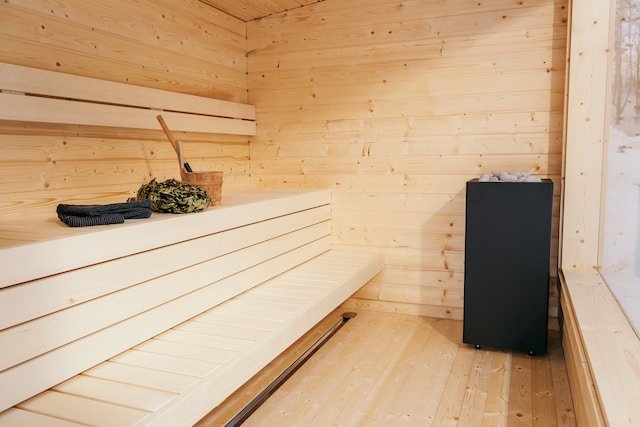Saunas have been used for thousands of years for their health benefits. But what is the point of a sauna? Spending time in a sauna can help promote stress relief, ease pain, and improve circulation. The heat in a sauna improves blood flow and raises skin temperature, which can lead to sweating and the release of endorphins.
Additionally, saunas have been shown to benefit heart health when practiced safely. Overall, the point of a sauna is to provide a relaxing and therapeutic experience for the body and mind.
Feeling stressed, achy, or simply in need of a wellness boost? You might find the solution in the heat-infused atmosphere of a sauna. Our article will explore all facts of saunas; from relaxation to detoxification, showing how this age-old thermal therapy can amplify your health and well-being.
Ready for a warm revelation ? Continue reading!
Key Takeaways
- Saunas provide relaxation and pain relief by easing muscle tension and promoting the release of natural painkillers in the body.
- Regular sauna use can improve cardiovascular health by lowering blood pressure, improving circulation, and reducing the risk of heart-related diseases.
- Saunas can aid in weight loss by increasing heart rate, and metabolic rate, and temporarily eliminating toxins and excess water from the body.
- Saunas help purify the skin by opening up pores, removing impurities, and contributing to a clearer complexion.
Benefits Point of a Sauna
Saunas provide relaxation, pain relief, improved cardiovascular health, weight loss, and skin purification.

Relaxation
Saunas help you to relax. The heat from the sauna eases your body and calms your mind. You sit in a warm room. Your body feels less stress right away. Aches and pains begin to fade away.
Sauna heat is good for muscle recovery too. It aids in kicking out tension and stiffness from muscles after hard work or exercise. This makes you feel light and relaxed.
Pain relief
Saunas can provide effective pain relief for various conditions. The heat from the sauna helps to relax muscles and reduce muscle tension, which can alleviate pain in areas such as the back, neck, and joints.
Sauna therapy also improves blood circulation, delivering oxygen-rich blood to injured tissues and helping them heal faster. This increased blood flow can relieve pain caused by inflammation or poor circulation.
Additionally, saunas promote the release of endorphins – natural painkillers produced by the body – which can further reduce discomfort. Whether it’s chronic pain or soreness from a tough workout, spending time in a sauna can offer much-needed relief.
Improved cardiovascular health
Saunas offer benefits for cardiovascular health. Regular sauna use can help lower blood pressure and improve blood circulation. The heat from the sauna causes blood vessels to dilate, which increases blood flow to the heart and muscles.
This improved circulation can lead to better overall cardiovascular function. Sauna bathing has also been linked to reduced risk of cardiovascular mortality, meaning it may help decrease the chances of developing heart-related diseases or experiencing a heart attack or stroke.
Additionally, saunas have shown promise in improving risk prediction for both men and women when it comes to cardiovascular health. By using a sauna regularly and following safety precautions, individuals can potentially experience these positive effects on their heart health.
Weight loss
Using a sauna can assist with weight loss. When you sit in a sauna, your body temperature rises, causing you to sweat. This sweating helps to eliminate toxins and excess water from your body, which can result in temporary weight loss.

Additionally, saunas increase your heart rate and metabolic rate, which can help burn calories and aid in weight management. However, it’s important to note that sauna use alone is not a substitute for regular exercise and a healthy diet when it comes to sustained weight loss.
Skin purification
Saunas can also help with skin purification. When you sweat in a sauna, your pores open up and release toxins from the skin. This can lead to clearer and healthier-looking skin. Sauna sessions can be particularly beneficial for individuals with acne or other skin conditions, as it helps to remove impurities from the surface of the skin.
Regular sauna use may contribute to a more radiant complexion and improved overall skin health.
Risks of Saunas
Saunas pose several risks to individuals, including dehydration, dizziness or fainting, temporary low sperm count, blood pressure issues, and potential risks for those with certain medical conditions.
Dehydration
Saunas can cause dehydration, which means your body loses too much water. When you sweat a lot in the sauna, it’s important to drink plenty of fluids to stay hydrated. Dehydration can make you feel tired and dizzy and can even lead to more serious health problems.
Make sure to drink water before and after using the sauna to keep your body hydrated.
Dizziness or fainting
Using a sauna can sometimes cause dizziness or fainting. This is because the high temperatures in the sauna can lead to dehydration and lower blood pressure. When you’re exposed to heat for a long time, your body sweats more, which can result in fluid loss.
This loss of fluids can make you feel lightheaded or dizzy. Additionally, the heat from the sauna causes blood vessels to expand, which lowers blood pressure and can also contribute to feelings of dizziness or fainting.
It’s important to stay hydrated while using a sauna and listen to your body if you start feeling dizzy or lightheaded.
Temporary low sperm count
Using a sauna can temporarily lower sperm count in men. This occurs because the heat from the sauna can affect sperm production. However, this decrease in sperm count is usually temporary and reversible.
It’s important to note that regular sauna use does not cause permanent infertility or impact overall fertility levels. If you’re concerned about your reproductive health, it’s a good idea to talk to your healthcare provider for personalized advice based on your specific situation.
Blood pressure issues
Using a sauna can have an impact on your blood pressure. Saunas are known to lower blood pressure levels, which is beneficial for individuals with high blood pressure. The heat from the sauna causes the blood vessels to dilate, allowing for improved circulation and reduced strain on the heart.
However, it’s important to be cautious if you already have low blood pressure or if you’re taking medication that affects your blood pressure. Make sure to consult with a healthcare professional before using a sauna if you have any concerns about your blood pressure.
Risks for certain medical conditions
Certain medical conditions can increase the risks associated with using saunas. It is important to be aware of these risks and avoid sauna use if you have any of the following conditions:
- Heart disease: Saunas can put additional strain on the heart, so individuals with heart disease should avoid using them.
- High blood pressure: Saunas can temporarily raise blood pressure levels, which can be dangerous for individuals with hypertension.
- Diabetes: Sauna use can affect blood sugar levels, so it is important for individuals with diabetes to monitor their levels closely.
- Respiratory conditions: People with asthma or other respiratory conditions may find that the hot and humid environment in a sauna worsens their symptoms.
- Skin conditions: Certain skin conditions, such as eczema or psoriasis, may be aggravated by the heat and steam in a sauna.
Who Should Avoid Saunas
Pregnant women, individuals with certain medical conditions (such as heart disease or high blood pressure), children, and older adults.
Pregnant women
Saunas are generally not recommended for pregnant women. The high temperatures in saunas can raise the body temperature too much, which may harm the developing baby. It’s important for pregnant women to avoid overheating to reduce the risk of birth defects or complications.
It is better to consult with a doctor before using a sauna while pregnant.
Individuals with certain medical conditions (heart disease, high blood pressure, etc.)
People with specific medical conditions should avoid saunas. These conditions include:
- Heart disease
- High blood pressure (hypertension)
- Certain heart rhythm disorders
- Heart valve problems
- Severe aortic stenosis (narrowing of the heart’s aortic valve)
- Unstable angina (chest pain)
- Recent heart attack or stroke
- Severe liver or kidney disease
Children
Children should avoid using saunas due to the potential risks involved. Saunas can cause dehydration, dizziness, and low blood pressure, which can be dangerous for children’s developing bodies.
Additionally, saunas may not be suitable for children with certain medical conditions such as heart disease or high blood pressure. It is important for parents to prioritize their child’s safety and consult with a healthcare professional before allowing them to use a sauna.
Older adults
Saunas can be beneficial for older adults in many ways. They can help relieve aches and pains, promote relaxation, and assist with muscle recovery. Additionally, saunas are known to improve mental clarity and reduce the risk of cardiovascular mortality.
However, it is important for older adults to take precautions when using saunas, as they may be more susceptible to dehydration and dizziness. It is always recommended for older adults to consult with their healthcare provider before using a sauna to ensure it is safe for them.
Conclusion
In conclusion, saunas serve as a way to relax and unwind while also offering various health benefits. They can help relieve pain, improve cardiovascular health, aid in weight loss, and detoxify the skin.
However, it is important to be aware of the risks and consult with a healthcare professional before using a sauna, especially for pregnant women or individuals with certain medical conditions.
Overall, when used safely and responsibly, saunas can be a valuable addition to one’s wellness routine.
General Facts
- Saunas can help relieve aches and pains and promote relaxation.
- Using a sauna can lower blood pressure.
- Saunas can assist in muscle recovery.
- Saunas can help with stress and depression.
- Saunas are beneficial for decreasing elevated blood pressure levels.
- Using a sauna after exercising can enhance fitness gains and improve overall health.
- Saunas offer better mental clarity.
- Sauna bathing is associated with reduced cardiovascular mortality.
- Saunas improve risk prediction in men and women.
- Saunas can benefit heart health as long as safety precautions are followed.
FAQs
What are the benefits of using a sauna?
Using a sauna can help relax muscles, improve circulation, relieve stress, and promote detoxification through sweating.
How long should I stay in a sauna?
It is recommended to start with shorter sessions of around 10-15 minutes and gradually increase the time as you become accustomed to the heat.
Are there any risks or precautions associated with using a sauna?
Some precautions when using a sauna include hydrating before and after, avoiding alcohol or drugs beforehand, and listening to your body’s signals to avoid overheating.
Can anyone use a sauna?
Most people can safely use saunas; however, individuals with certain medical conditions such as high blood pressure or heart problems should consult their doctor before using one.

1 thought on “What is the Point of a Sauna?”